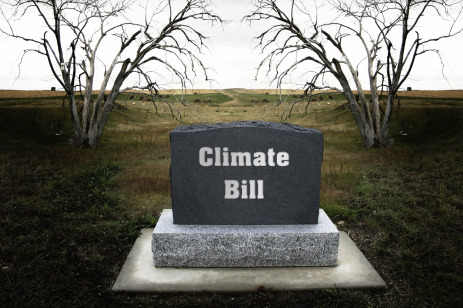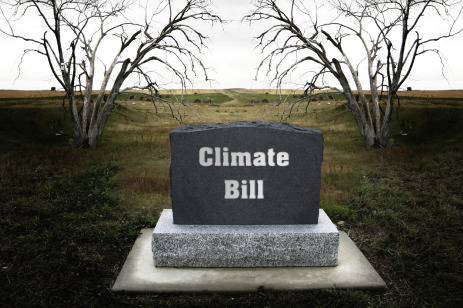 Will we soon be singing RIP to the RES as well?Senate Majority Leader Harry Reid (D-Nev.) found new ways to let the public know there is absolutely no way the U.S. will get a climate and energy bill this year, the failure of which climate activist Bill McKibben lays at the feet of attempts to make the issue about energy security and the economy.
Will we soon be singing RIP to the RES as well?Senate Majority Leader Harry Reid (D-Nev.) found new ways to let the public know there is absolutely no way the U.S. will get a climate and energy bill this year, the failure of which climate activist Bill McKibben lays at the feet of attempts to make the issue about energy security and the economy.
The aftermath of the climate bill has been opportunity for a cast of experts to opine about what comes next. On the table: the usual debate about investing in research and development of new technology vs. rolling out existing technology, and yet more calls for a national Renewable Energy Standard (RES), which probably won’t happen even though it would be great for the renewable power industry.
Congress’s failure to pass even an RES was the direct reason the U.S. fell to second place, behind China, in Ernst & Young’s index of the world’s best places to invest in renewable energy.
President Obama wants $50 billion for the nation’s transportation infrastructure, but the plan to pay for it by taking back some oil and gas industry tax breaks is going to be a tough sell among legislators backed by those groups.
Sunny climes warm to climate legislation: The Koch brothers, recently in the news because of a lengthy profile in The New Yorker outlining, among other things, their funding of groups hostile to action on climate change, just donated $1 million to the effort to repeal California’s greenhouse gas emissions standards. Politicians in favor of the proposition are getting heat from their eco-conscious constituents.
Shifting political winds in Australia have that country’s Greens Party declaring right now is the best opportunity they’ve ever had to pass legislation that will result in substantial emissions reductions.
Obama’s proposal to let businesses write-off the full value of new equipment purchases is also an accidental emissions-reduction plan.
Scientists get political: In a rare, explicitly political editorial, the world’s top science journal decried the “anti-science strain pervading the right wing in the United States.”
China gets aggro on messaging, energy: China tells the world it will always prioritize its national interests above cutting its emissions, even as its regional leaders inflict blackouts on their constituents in order to meet national energy-saving targets set by Beijing.
A massive new offshore wind project in China underscores the fact that the country is no longer a hub of manufacturing, but increasingly an innovator in its own right.
The HSBC group is projecting a tripling of the global market for low-carbon energy by 2020, with the fastest growth in China. The U.S., meanwhile, is about to drop $575 million across 15 states for clean coal.
Preventing wars spawned by climate change: Climate change will lead to “irregular challenges” for the U.S. military, but the debate over whether it already has just got more interesting. A new paper says recent wars in Africa cannot be attributed to our warming world.
Water storage will be increasingly necessary to guarantee food security in the developing world, which is already experiencing jumps in food prices reminiscent of 2008, all due to this year’s extreme weather.
The irrigation on which so much food production depends has a second effect — it may be cooling some areas of the planet as much or more than climate change has warmed them, an effect that will disappear if the underground aquifers enabling this practice run dry.
Meat: Not a climate villain after all?: Eco-pundit George Monbiot reviews a new book that declares meat is not inherently a climate villain — it’s how we produce it that’s the problem.
Nuclear: Still not green: An incredibly detailed review of the literature declares that nuclear is, at best, only marginally better than natural gas at either returning invested energy to its producers or reducing greenhouse gas emissions.
Getting (green) power to those who have none: A pair of special reports address efforts to exploit the fact that renewables are inherently a distributed form of power generation to bring electricity and lighting to India and the developing world in general.
The spotlight shifts to adaptation: The New York Times‘s Andrew Revkin points out that a lot of our vulnerability to extreme weather is a
systematic inability or unwillingness to plan for rare but not impossible events. This may be one reason why the world’s insurer’s are demanding a role in helping the U.N. come up with climate change adaptation plans for the developing world.
A forthcoming book from a pair of esteemed Stanford environmental scientists sums up the general mood: Preparing for Climate Change.
The Climate Post offers a rundown of the week in climate and energy news. It is produced each Thursday by Duke University’s Nicholas Institute for Environmental Policy Solutions.

